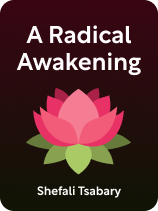

This article is an excerpt from the Shortform book guide to "A Radical Awakening" by Shefali Tsabary. Shortform has the world's best summaries and analyses of books you should be reading.
Like this article? Sign up for a free trial here.
What’s the real impact of choosing one partner for life? How does our biology align with society’s expectations about relationships?
Psychologist Dr. Shefali Tsabary challenges traditional views on marriage and partnership, offering fresh perspectives on human connection and commitment. She believes that science and history reveal important insights about our natural capacity for lasting partnerships.
Continue reading to learn about the disadvantages of monogamy and why non-monogamy resonates with some people.
The Disadvantages of Monogamy
According to Tsabary, the notions that society preaches about monogamy and the nature of relationships contradict human nature. She explains why she believes this, and she identifies what she believes are the disadvantages of monogamy. She also shares some beliefs about marriage that she thinks are detrimental.
Tsabary believes that human nature is tailored toward non-monogamy rather than monogamy, as society preaches. Tsabary claims that the different biopsychologies of men and women support this claim—men are fertile all the time and can impregnate infinite women; therefore, their nature is to constantly seek partners to spread their genes. On the other hand, women are fertile only once a month and can produce a limited number of children, therefore they must be highly selective in their partner to ensure strong offspring—but each child doesn’t need to have the same father.
Further, says Tsabary, human tribal history shows that most communities were non-monogamous and that children were raised by the community rather than a mother-father unit. This allowed children to receive constant attention and care without a nuclear family. This community structure supported non-monogamy because it allowed adults to have relationships and children with multiple partners without negatively impacting child rearing and development.
Ultimately, our biopsychology and history show that humans thrived in non-monogamous communities.
| Evolutionary Psychology: A Case for and Against Monogamy In Sex at Dawn, Christopher Ryan and Cacilda Jethá reiterate Tsabary’s claims in support of humans’ non-monogamous nature. However, they add to the discussion by providing support for the “standard narrative” as well—the opposing claim that monogamy is actually our natural state. Ryan and Jethá explain that the standard narrative is backed by two main assumptions. First is the nature of men and women’s reproductive goals. For example, women’s libido is lower than men’s, therefore sex is somewhat of a trade-off—she provides exclusive sex to one partner in exchange for resources and protection (she doesn’t have a desire for multiple partners). On the other hand, men are driven to have sex to spread their genes, but they’re only driven to provide for children they know are theirs; therefore, monogamy allows them to ensure this goal is met. The second assumption supporting the standard narrative is the difference in jealousy between men and women—women get jealous when their partners are emotionally intimate with others while men get jealous when their partners are sexually intimate with others. This difference in jealousy supports the previous two theories—men get jealous about sexual intimacy because it threatens their ability to ensure their offspring is their own, and women get jealous about emotional intimacy because it risks the potential of their partner giving their resources and protection to another woman instead. This possessiveness supports the argument that we’re meant to be monogamous. |
While Tsabary recognizes that non-monogamy isn’t for everyone, she emphasizes that simply accepting the standards of monogamy without introspection can cause major problems.
First, committing to one person for the rest of your life without question often causes both men and women to sabotage their happiness and fulfillment. Tsabary believes that it’s highly unlikely for one person to fulfill all your mental, emotional, and sexual needs for the rest of your life. Therefore, monogamy often causes people to suffer with unfulfilled needs by denying them the opportunity to connect with people who can meet those needs.
(Shortform note: Numerous studies support Tsabary’s claim, finding that consensually non-monogamous couples tend to rank higher in relationship satisfaction and commitment. One study from 2020 also reported that 42% of non-monogamous individuals believed that the diversity in their relationships allowed them to fulfill a wider variety of their needs, as Tsabary theorizes would be the case.)
Meeting these needs is important, explains Tsabary, because they’ll lead to a point of breakdown if they go unmet for long enough. For example, we may begin to resent our partner who’s unable to provide the emotional support we need. Or, we deceive our partner by fulfilling sexual needs they don’t meet outside the relationship without their consent. Whether we want to or not, our subconscious mind will drive us to meet our needs—it’s better to do so in a healthy way than in unsatisfactory ways.
(Shortform note: Allowing your needs to go unmet has a variety of consequences. One outcome is entering an “unmet needs affair,” as Mira Kirshenbaum explains in When Good People Have Affairs. Kirshenbaum says that unmet needs affairs happen when one aspect of the relationship is lacking, for example sex or intimacy, and the person feeling the lack becomes obsessed with the missing part and overlooks all the other ways in which the relationship works. However, it’s important to note that having unmet needs isn’t an excuse to cheat—the unmet needs often cloud your vision and cause you to act counterproductively. In the following note, we’ll discuss how to handle unmet needs in your relationship.)
This isn’t to say you need to leave your primary partnership to satisfy your needs—Tsabary believes you can explore other connections while maintaining a loving relationship with your primary partner. This is possible because, according to Tsabary, love and commitment are about much more than sex—they’re about regular connection and shared experiences. If partners are committed to dedicating time to each other and growing together, and agree on being non-monogamous, they can continue a happy partnership while meeting unfulfilled needs outside the relationship.
(Shortform note: Non-monogamous relationships aren’t for everyone so looking to fulfill unmet needs with other partners might not be a viable solution for many people. Other techniques you can try to fulfill your needs within your relationship include talking about your needs—it’s possible you and your partner have never discussed this with each other. Ask each other what makes each of you feel important, what makes each of you feel connected, and what you each need to feel safe in the relationship. You can also take an inventory of how well you’re meeting each other’s needs currently to identify areas of improvement.)
The Detriments of Marriage Myths
Tsabary continues to argue that our beliefs surrounding marriage can also cause major turmoil. We’re taught that, once the marriage contract is made, it should never be broken. This causes many women to endure unhappy and even abusive marriages due to the stigma they fear facing upon divorce.
(Shortform note: Tsabary notes that many women fear divorce due to the societal stigma they’ll endure such as allegations of being a bad wife or mother. However, many women may fear divorce due to more tangible negative effects. Studies show that while men and women both experience negative effects from divorce, women experience more severe emotional and financial issues.)
Further, Tsabary says that, while we’re taught that marriage is the ultimate guarantee of love, love comes from partners’ commitment to constantly grow together. People think that once they get married, their relationship is set in stone and will never change. Tsabary explains that this is unrealistic because people are constantly changing—if you cling to a past state of your partner or relationship, you create distance that can be irreconcilable.
(Shortform note: Gary Chapman emphasizes this point in The 5 Love Languages, explaining that many people think marriage is the epitome of love because they operate under the belief that once you fall in love, you’ve won the game. In reality, there are two processes when it comes to love and having a happy relationship: falling in love, and maintaining love. To maintain love—or successfully grow together—Chapman says that couples need to learn how to speak each other’s love language. Your love language is the way you feel love—according to Chapman, either through words of affirmation, quality time, physical touch, acts of service, or receiving gifts.)
Tsabary says that true love and commitment require you to accept the evolving nature of your partner and relationship, and commit to growing alongside them. Part of committing to this growth is realizing when two people also naturally grow apart—if this happens, a marriage contract can’t preserve love. Instead, partners who are no longer compatible must acknowledge this and release each other so they can continue to grow on their own paths and reach their individual potentials.
(Shortform note: Knowing when to finally stop trying to fix problems and instead call it quits can be difficult, especially when you still love your partner. There are a few signs you can look for that will indicate it may be time to separate rather than continuing to work on things. For example, if abuse is occurring in the relationship, even minor incidents, this is a sign to break things off as these incidents often escalate. Further, if you fundamentally disagree on vital issues—for example, whether you want kids or how you want to raise them—this is also a sign that separation is the right option.)

———End of Preview———
Like what you just read? Read the rest of the world's best book summary and analysis of Shefali Tsabary's "A Radical Awakening" at Shortform.
Here's what you'll find in our full A Radical Awakening summary:
- The patriarchy’s impact on women’s sense of identity
- The destructive societal myths that dictate women’s lives
- How women can break the patriarchal cycle they were raised in






